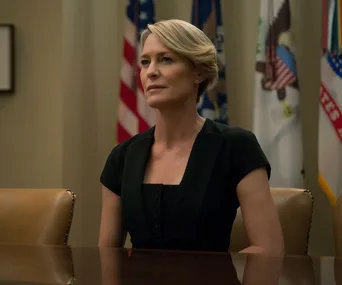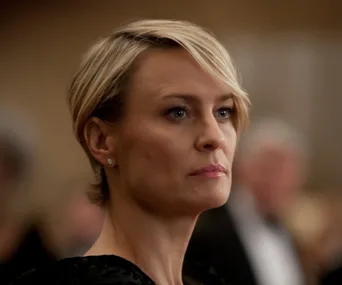It’s finally Claire Underwood’s turn in the oval office in the sixth and final season of House of Cards.
Robin Wright, who has portrayed the formidable Claire for the past five seasons of the hit political drama series, will be stepping even further in to the spotlight as her former co-star Kevin Spacey, who played Claire’s husband Frank Underwood, has been let go.
Here, Robin speaks exclusively to TV WEEK about the upcoming season, the departure of Kevin Spacey, and the show’s “shock” end.
Q: How would you describe this final season of House of Cards?
RW: “It’s basically an exploration of Claire Underwood getting her turn. It’s her orchestrating, in her way, how to run the country.”

Robin Wright as Claire Underwood.
Q: How does Kevin Spacey’s exit affect the tone of the show?
RW: “Truthfully, the arc was always going to be the same. At the end of Season Five, Claire looked into the camera and said, ‘It’s my turn.’ It was always going to be the exploration of that. It was going to be about the adversity she would be up against as a woman and that is exactly what we did. She is going to have to make friends to create enemies and to get through this administration.”
Q: Will audiences be satisfied with Frank Underwood’s exit?
RW: “It’s impossible to completely ignore or delete the character and that was never the intention. It’s in the atmosphere and talked about, especially with Doug Stamper. Frank was his identity, his alter-ego and his touchstone to reality. To have lost that adds a whole other element of drama.”
Q: Why was it important to finish this story with one more season?
RW: “To close out the show the way it was intended for the fans. Equally important was that, had we not come back, we would have put more than 600 people out of a job. It was only fair to finish with the security that the cast and crew expected and they were all wonderful. We had such an incredible family of people on this show. We were gifted.”

The sixth season of House of Cards is highly anticipated.
Q: How did it feel playing the first female President of the United States?
RW: “When I into the camera at the end of Season Five, I was like, ‘That is not my place, I can’t do that.’ But once you own it you feel like you are in the room. You feel like everyone is complicit with you. The feeling of powerfulness is very freeing.”
Q: How did you approach developing the character for her role as President?
RW: “That was always part of the discussion from Season One. I said, ‘I don’t know female politicians and I don’t want to know them!’ I wanted to build my own character. I said, ‘I don’t really know her outside of this idea that she is this template of Lady Macbeth, while Francis was Richard III.’ I needed something to chew on outside of the Louboutins and the Prada dresses even though putting on that stuff helped me I find her physicality. It was David Fincher who told me, ‘You, as Claire, are that marble bust that sits in the Capitol. You are kind of an anonymous bust. You could be that president or that leader but you are not quite sure who she is. Slowly, as these seasons unveil, her veneer will start to crack and you will see the human inside her.’ That’s who Claire always was to me.”
Q: How do you see Claire Underwood’s relationship with the audience?
RW: “That was a big part of the discussion before this season, how is her relationship going to be different? Frank was always campaigning to the audience, no matter what he was unveiling, sharing or lying about. He was campaigning for attention and loyalty. Claire is tell you the truth and letting you know how vulnerable she is and how scared she is sometimes. There is more posing questions to the audience and wanting their help.”
Q: How do you feel to have finished your time on the show?
RW: “It was very important to give the audience what they deserve so, in a way, it’s a relief that we got this far because at the end of every season, we never knew if we are getting picked up again. Because of that we always had to have script version A over here if we get picked up, and then version B in case we didn’t get extend for another year. Juggling those balls all of the time as writers, producers and actors was invigorating but exhausting so it’s bittersweet to say goodbye. You always want to put a character to bed and sometimes it’s melancholic, but this was huge. It’s so different than making a movie. This was six years, five or six days a week, 14 hours a day. We were married. We spent more time together than we did with our families so many tears that last night of shooting.”
Q: Will people be happy with the ending?
RW: “I hope so! We were puling out all of the stops but how could we top what is going on in the news today? (laughs)”

Robin Wright stars as the first female President of the United States.
Q: What was it like swapping between acting and directing for the finale?
RW: “It’s so different being involved with all of the different departments and we were all part of the direction. That kind of collaboration is incredible. As an actor, you are very much alone. You are in your trailer by yourself, reading your lines and talking the lines to yourself. You are making your choices by yourself. Then you come onto set and you do a little bit of rehearsal with another actor. As a director, you have to have your hands in every pot and be open to all kinds of suggestions. It was definitely exhausting doing all of those things at the same time, but so much fun.”
Q: What made you want to direct?
RW: “Having to keep my mouth shut for the last 15 years as an actor while thinking, ‘That’s not how to direct that acting!’ Sometimes you are bursting at the seams.”
Q: Finally, what can you say about the fate of the characters on House of Cards?
RW: “The show is about the battle for the position of power, all the way around so this is really about who wins. I won’t spoil it bit I will say that it’s so beautifully macabre and so dark. It’s going to shock the sh** out of you basically!”
House of Cards season six premieres Friday 2nd of November on Netflix.

